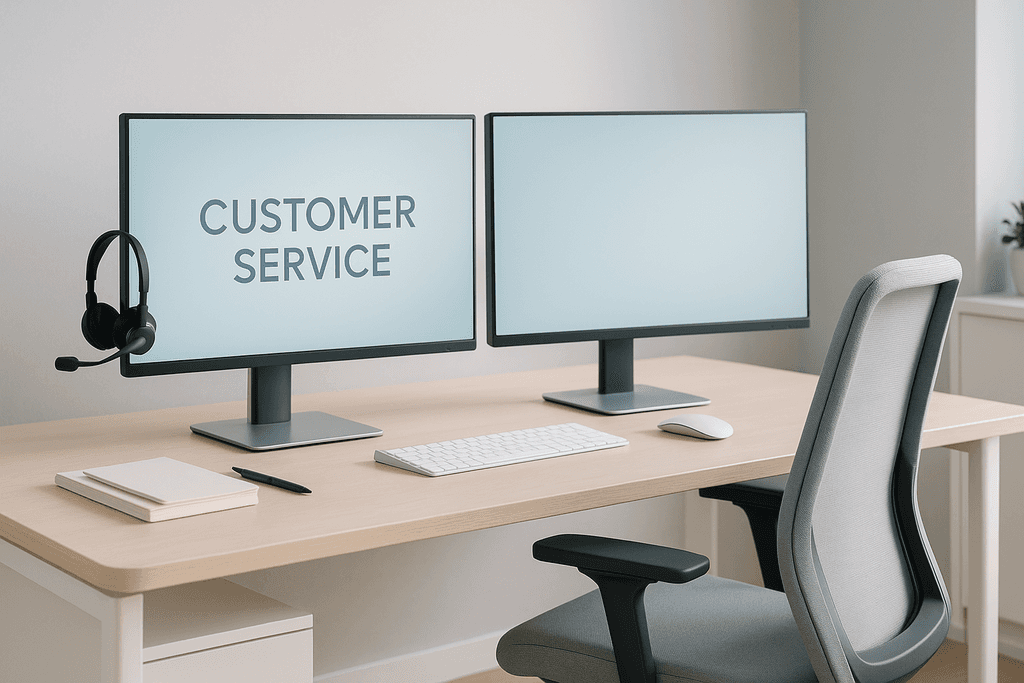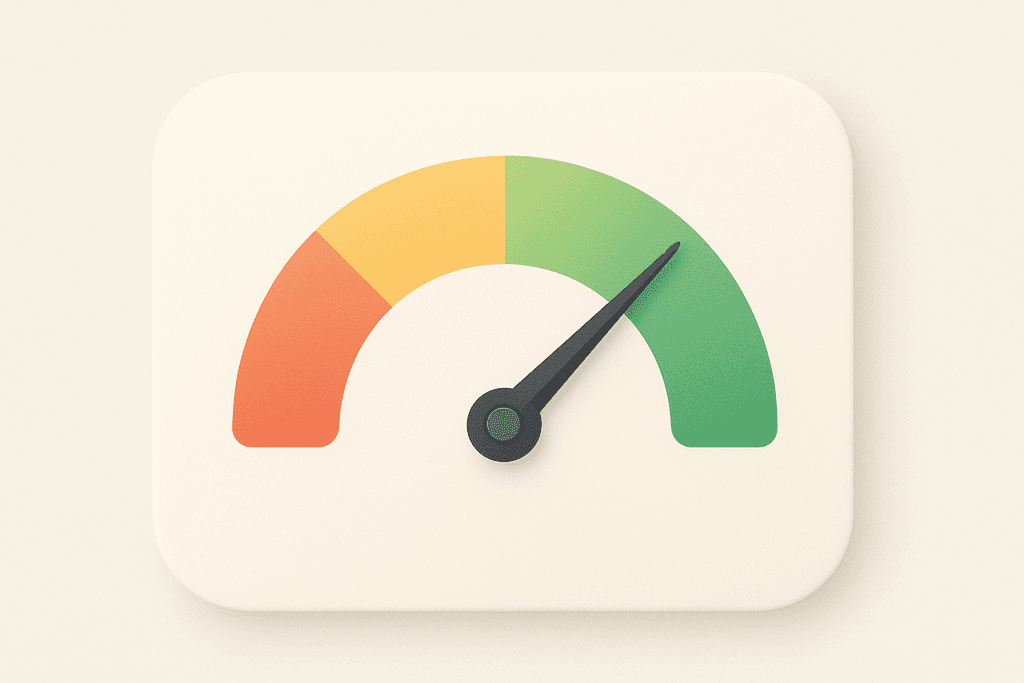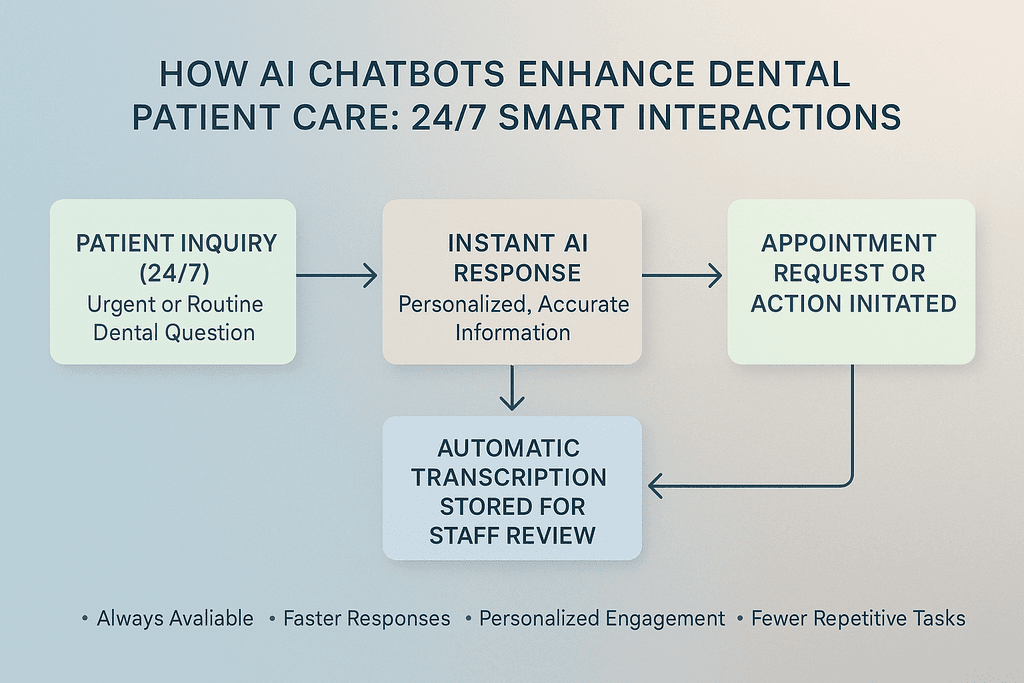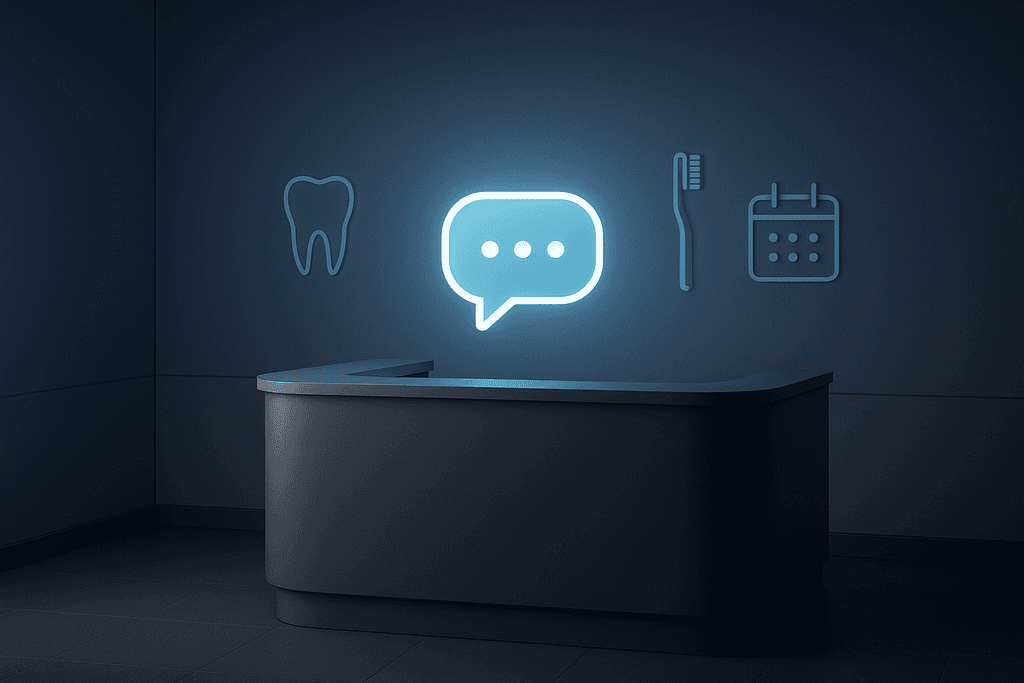Imagine waking up at 2 AM with a throbbing toothache and no way to get immediate answers. This all-too-common scenario is driving dental practices to adopt innovative solutions like dental clinic chatbots. These AI-powered assistants are revolutionizing after-hours patient care, providing instant responses to urgent questions and easing anxiety when dental offices are closed.
Table of Contents
The Evolution of Dental Practice Communication
Did you know that 75% of patients prefer digital communication with their healthcare providers? This trend is reshaping how dental practices interact with their patients, moving far beyond the traditional phone call system.

Historically, dental offices relied on a mix of phone calls, postcards, and in-person conversations to manage patient communications. This approach, while personal, had significant limitations:
- Limited availability outside office hours
- Long wait times during peak calling periods
- Inefficient use of staff time for routine inquiries
- Difficulty in managing high volumes of patient requests
The digital age has dramatically shifted patient expectations. Modern dental patients now seek:
- 24/7 access to information and support
- Quick responses to their questions
- Convenient ways to schedule appointments
- Personalized care and attention
To meet these evolving needs, dental practices are turning to AI-powered solutions. Chatbots, in particular, are emerging as valuable tools for managing after-hours patient inquiries. These digital assistants can handle a wide range of tasks:
- Answering frequently asked questions
- Providing basic dental care advice
- Assisting with appointment scheduling
- Offering emergency guidance when needed
The adoption of AI in dental communication is not just a trend, but a necessity for practices looking to stay competitive and patient-focused. As noted in a DentistryIQ article, AI dental webchats can significantly improve front desk operations, freeing up staff to focus on more complex patient needs.
| Communication Method | Patient Satisfaction | Staff Efficiency |
|---|---|---|
| Traditional Phone | 60% | 40% |
| AI Chatbot | 85% | 75% |
As we move forward, dental practices that embrace these digital tools are likely to see improvements in patient satisfaction and operational efficiency. The OnCall Bot, for instance, offers 24/7 support and personalized responses, addressing the growing demand for always-on dental care communication.
Key Features of Dental Clinic Chatbots
Dental chatbots are changing how practices handle after-hours patient questions. These AI assistants work around the clock, giving patients quick answers when the office is closed.
Here are some key features that make dental chatbots so useful:
- 24/7 availability – Patients can get help anytime, even at 2 AM
- Appointment scheduling – Book visits without calling during business hours
- Personalized responses – Tailored answers to common dental questions
- Practice management integration – Syncs with existing office systems
The OnCall Bot offers all these features and more, designed specifically for dental practices. It acts like a friendly virtual front desk assistant, always ready to help patients.
Benefits for Dental Practices and Patients
Adding a chatbot to your dental practice website can really pay off. Let’s look at how it helps both the office staff and patients:
For Dental Practices
- Less work for staff – No more answering basic questions all day
- Better efficiency – Automates routine tasks
- More appointments booked – Makes scheduling easy 24/7
- Fewer no-shows – Sends automatic reminders

For Patients
- Quick answers anytime
- Easy appointment booking
- Less time on hold
- Help with dental emergencies
A case study of a dental clinic using AI chatbots showed big improvements in patient satisfaction. People liked getting fast help without waiting for office hours.
Implementing Chatbots in Your Dental Practice
Ready to add a chatbot to your practice? Here’s how to get started:
| Step | Description |
|---|---|
| 1. Assess your needs | Figure out what tasks you want the chatbot to handle |
| 2. Choose a solution | Pick a dental-specific bot like The OnCall Bot |
| 3. Set up and integrate | Connect the bot to your website and practice management system |
| 4. Train your team | Show staff how to use and manage the chatbot |
| 5. Educate patients | Let patients know about the new 24/7 help option |
When picking a chatbot, dental-specific options like The OnCall Bot often work better than generic ones. They understand dental terms and common patient questions.
A study on chatbot performance in endodontic clinical scenarios found that specialized dental chatbots gave more accurate answers than general AI assistants.
Setting up your chatbot doesn’t have to be hard. The OnCall Bot, for example, integrates easily with most dental practice systems. You’ll be up and running in no time, giving patients round-the-clock support.
Measuring Success
Once your chatbot is live, keep an eye on these metrics:
- Number of after-hours inquiries handled
- Appointments booked through the bot
- Patient satisfaction ratings
- Staff time saved on routine questions
Many practices see big improvements in these areas after adding a chatbot. The OnCall Bot provides detailed reports so you can track your progress easily.
Remember, a chatbot isn’t meant to replace human interaction. It’s a tool to enhance your patient care, letting your team focus on more complex tasks during office hours. With the right setup, it can make your practice more efficient and your patients happier.

The Future of AI in Dental Patient Care
AI chatbots are changing how dental practices handle after-hours patient care. These smart assistants are getting better at understanding and responding to patient questions, making them feel more like talking to a real person.
Here are some key ways AI is improving dental patient care:
- 24/7 availability for urgent questions
- Faster responses to common concerns
- Personalized interactions based on patient history
- Reduced workload for office staff
As natural language processing advances, these bots will have more human-like conversations. They’ll pick up on context and emotions better, providing more empathetic support.
We’re also seeing chatbots team up with teledentistry platforms. This combo lets patients:
- Describe symptoms to the bot
- Get initial guidance
- Schedule virtual consults if needed
Looking ahead, AI may even help with treatment planning. Imagine a bot that can:
- Analyze patient data and images
- Suggest potential treatment options
- Estimate costs and timelines
Of course, dentists would still make final decisions. But AI could speed up the process and give patients a head start on understanding their options.
Recent research comparing AI responses in dentistry shows these systems are getting more accurate. They’re not perfect yet, but they’re improving fast.
For dental practices looking to stay ahead, products like The OnCall Bot offer a taste of this AI-powered future. It handles after-hours questions, appointment requests, and more – freeing up staff time while keeping patients happy.
Wrap-up
Dental clinic chatbots are changing how practices handle after-hours questions. They give patients quick answers anytime, which makes them happy. For dental offices, chatbots cut down on phone calls and free up staff time. It’s a win-win.
The OnCall Bot is built just for dentists. It knows dental lingo and can book appointments too. Patients like talking to “Betty”, the friendly bot persona. Offices get detailed chat logs to follow up on later.
As more people expect 24/7 service, dental practices need to keep up. Chatbots help do that without breaking the bank or burning out staff. They’re worth checking out if you want to improve your customer support. The dental world is going digital – is your practice ready?
Next up, we’ll tackle some common questions about dental chatbots. Stay tuned to learn more about how they work and what they can do for your practice.
Common Questions About Dental Clinic Chatbots
How much does a dental clinic chatbot cost?
Dental clinic chatbot costs vary depending on features and scale. Many providers offer affordable monthly plans starting around $50-100 per month. Some, like The OnCall Bot, have a one-time setup fee and then a low monthly rate for unlimited patient interactions. It’s best to compare a few options to find one that fits your budget and needs.
Are dental chatbots HIPAA compliant?
Yes, reputable dental chatbot providers ensure their systems are HIPAA compliant. They use encryption, secure data storage, and strict access controls to protect patient information. When choosing a chatbot, always confirm its HIPAA compliance status with the provider.
Can I customize the chatbot for my practice?
Most dental chatbots offer customization options. You can usually tailor the bot’s responses, add specific information about your services, and even give it a name that fits your practice’s brand. Some providers, including The OnCall Bot, allow you to personalize the chatbot’s “personality” to match your clinic’s tone.
How do patients react to chatbots?
Patient acceptance of chatbots is generally positive, especially for after-hours support. Many appreciate the 24/7 availability and quick responses. To improve acceptance, it’s important to clearly communicate that they’re interacting with a bot and offer an option to reach a human if needed.
What types of questions can dental chatbots handle?
Dental chatbots can handle a wide range of common inquiries. This includes scheduling appointments, providing office hours and location info, answering basic dental care questions, and explaining services offered. More advanced bots can even offer preliminary symptom assessment and triage for dental emergencies.

No responses yet